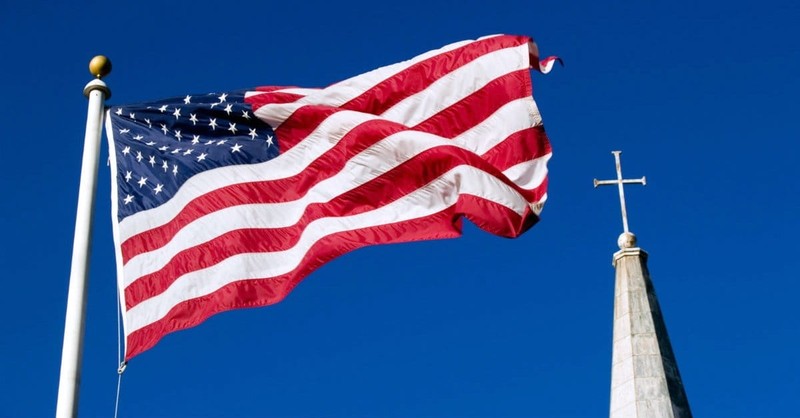Should Pastors Endorse Political Candidates from the Pulpit?
- Liberty University Sponsored Article
- Updated Jun 28, 2016

We are in the thick of our next presidential race, and there is no shortage of personal opinions about candidates, platforms, issues, and outcomes. We see friends posting all over social media, we hear opinions on the news and the radio, but should we also hear endorsements from the pulpit?
Should our pastors get involved in politics? Is that part of their role? Should we look to them for advice on who to vote for, on how to feel about issues at hand, on how to engage with our nation’s government?
Dr. Tyler Scarlett, Adjunct Professor of Homiletics at Liberty University's School of Divinity and Pastor-Teacher of Forest Baptist Church, ultimately says no.
He uses Romans 13 and 14 as the basis for his argument. If you aren't familiar with these chapters, reading the NIV version alongside The Message paraphrase gives us a helpful and relevant starting point.
“Not only do pastors have a Romans 13 obligation to not publicly endorse a candidate,” Scarlett explains, “but we also have a Romans 14 obligation. In that chapter, Paul speaks directly to gray areas in the Christian life – issues that are not clearly spelled out as right or wrong in Scripture. He repeatedly says that there are matters of conscience where Christians can genuinely disagree. He states that we should not require others to necessarily do or think as we do. When these issues arise, we should not “judge” one another nor view each other with “contempt” (Romans 14:10). But rather, we should “have our own conviction before God.” (Romans 14:22) Basically, Paul is saying that while we should agree on the objective teachings of Scripture we will, at times, disagree on the subjective application of Scripture. Backing a specific presidential candidate is an effort at such application.
The combination of Romans 13 (respect the laws of the land) and Romans 14 (respect the conscience of your brother) is reason enough for pastors to exercise prudence and avoid endorsing candidates publicly.”
While Scarlett argues that pastors should not directly endorse specific individuals, he does express the importance of Christians engaging with politics.
“As Christians, we do not merely believe that He is Lord of what we do on Sunday in a church pew but that He is even Lord of what we do on a Tuesday in a voting booth,” Scarlett says.
As Christians who are also Americans, we have an opportunity to be part of choosing the leaders of our country, and we have a responsibility to demonstrate what we believe through our actions.
“You cannot have a risen Lord and a private faith,” Scarlett quotes from David Platt.
While Scarlett warns against direct endorsements, he gives pastors two main ideas to keep in front of their congregation:
1. Encourage people to think clearly and biblically about the issues at hand, while avoiding the mindless herd mentality of partisan politics. “Neither party represents the “Christian position” or real hope. They never have,” he says. It can be easy to go along with the crowds in politics, especially because they are often sharing messages that appeal to our emotions and convictions. Taking a step back from that herd mentality to really analyze what Scripture says in light of different issues or topics is essential for us as Christians.
2. Guard your attitude and words. “Yes, we should promote Christian ideas but we must do so in a distinctly Christian manner,” he says. “At the end of the day, we need to be sure that we preserve our gospel witness towards others by modeling humility, civility and dignity. It’s nearly impossible to talk speak politely with your neighbor about Jesus after you’ve harshly condemned them about their candidate of choice.” It can be easy for us to respond to messages on social media about politics and quickly get caught up in heated debates that can hurt our spiritual influence. James 1:19 advises that “everyone should be quick to listen, slow to speak and slow to become angry, because human anger does not produce the righteousness that God desires.” This should be our guiding force as this politically charged election season continues.
While pastors are indeed leaders for us spiritually, lines are blurred and divisions can occur among congregations when they step into leading us politically.
“Pastors are first and foremost shepherds of the souls of men and women, not political activists, life coaches or psychological gurus,” says Scarlett. “Ultimately, their role is to glorify Jesus Christ as Lord.”
For more on this topic, Scarlett recommends the following books: One Nation Under God by Bruce Ashford and Chris Pappalardo, Onward by Russell Moore and God and Politics by Mark Dever.
Written by Rachel Dawson, editor for BibleStudyTools.com. Sponsored by Liberty University, training champions for Christ since 1971; and Liberty University Online, the largest Christian university in the world with over 200 online programs.
Publication date: June 20, 2016



















